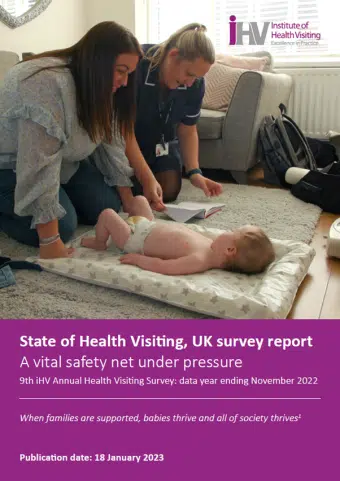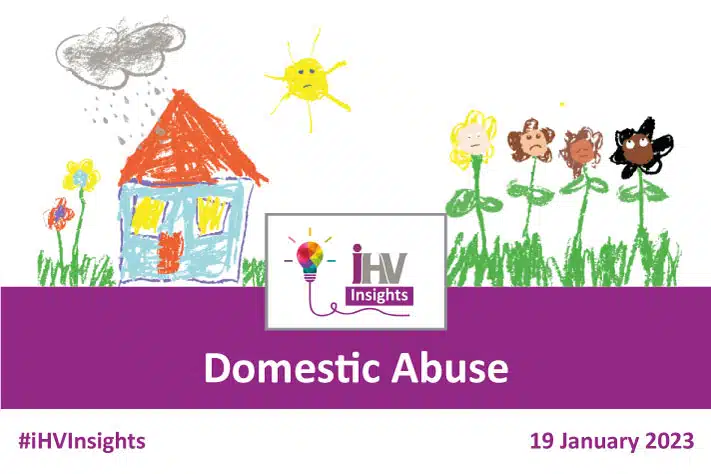The Institute of Health Visiting (iHV) publishes the findings from the largest UK survey of frontline health visitors working with families across the United Kingdom.
Our survey findings paint a bleak picture with health visitors seeing first-hand the realities that families with babies and young children in the UK are facing. Health visitors are reporting epidemic levels of poverty, with more parents struggling under the weight of the cost-of-living crisis that is forcing them to turn to food banks to feed their children. Alongside this, more parents are living with mental health problems, domestic abuse and adversity, that pose risks to the health and wellbeing of babies and young children.
Health visitors are witnessing the impacts of stress associated with poverty on children’s safety, health and development. At the same time, there are insufficient health visitors to meet the scale of rising need. This is being felt most acutely in England, as health visitors are battling to deliver a service following a loss of almost 40% of health visitors since 2015. Consequently, despite health visitors’ best efforts, many families are not receiving the support that they need, and this is being intensified by a lack of capacity in other health and social care services who are also experiencing extreme pressures.
Alison Morton, Executive Director at the Institute of Health Visiting, says,
“Through their universal reach, health visitors have a privileged and unique view into the lives of babies, young children and their parents/ carers across the UK. Health visitors’ experiences presented in this report provide an important ‘early warning signal’ of the most pressing threats and challenges to the health and wellbeing of our youngest citizens which are often hidden behind front doors and invisible to other services.
“The findings also paint a deteriorating picture of a health visiting workforce under immense pressure as practitioners struggle to meet the scale of rising need. Families are facing the brunt of these challenges with a widening postcode lottery of health visiting support across the UK.”
We publish at a time of ongoing uncertainty with political and economic instability, and ever-increasing health inequalities that will get worse if not addressed. The whole of the health and care system is also struggling to rebuild in the wake of the pandemic. As health visitors often work alone, or in small teams in families’ homes, their work is often hidden and it’s easy to overlook how important it is. The NHS backlogs regularly hit the headlines, but they are only one part of the legacy left by the pandemic on the healthcare system; less high-profile backlogs of care and unmet need in health visiting services have been overlooked within a ‘baby blind spot’ in national policy which will leave equally serious challenges for both mental and physical health for babies, children and families across the UK, now and in years to come.
Alison concludes:
“Because the first years of life are so important for lifelong health, wellbeing and success, ignoring this tsunami of unmet need being experienced by our youngest citizens risks undermining the life chances of so many children.
“It is not too late to change direction and pursue reforms, but the situation is serious. There is now unequivocal evidence that the current rate of health visitor workforce attrition, and insufficient training places to plug the forecasted gaps, is not sustainable and will jeopardise the delivery of all UK Governments’ child health programmes.
“In England, the Government categorised health visiting as one of six priority services in its Start for Life Vision for the first 1001 days. However, this commitment is at risk without investment and a plan to rebuild the health visitor workforce.”
Rising needs and widening inequalities – child safety, health and development: the problem, some key facts and stats:
- 91% of health visitors reported an increase in poverty affecting families over the past 12 months
- 91% reported an increase in families needing foodbanks
- 83% reported an increase in perinatal mental illness
- 75% reported an increase in domestic abuse.
Health visitors have witnessed first-hand the impact on babies and young children’s safety, health and development:
- 84% of health visitors reported an increase in children with speech, language and communication delay
- 76% an increase in child behaviour problems
- 60% of health visitors reported further increases in child safeguarding over the last 12 months (building on significant increases reported last year).
Health visitors in England also raised serious concerns that national data mask increases in child safeguarding, as:
- Children living with significant risk and vulnerability are not detected as services are cut, and
- Social workers’ caseloads are capped to a maximum – growing numbers of children living with significant risk and vulnerability now fall below higher thresholds.
Only 7% of health visitors in the UK felt confident that all families would be able to access the support they needed when a problem was identified. 86% reported that there was not enough capacity in other services to pick up referrals for support/ treatment
Our main policy recommendations:
- Prioritise the first 1001 days of life – a shared cross-government ambition and strategy for the first 1001 days is needed to improve health outcomes and reduce inequalities for babies, young children and families. This needs to be prioritised by the Treasury and seen as the smartest of all investments in our nation’s future, rather than as a cost.
- A shift towards prevention and early intervention is needed to support all people to lead healthy and fulfilling lives by addressing the key public health priorities that pose the greatest threats to our nation’s health, thereby preventing debilitating and costly ill health in later life.
- Equity of access to support is needed for all babies, children and families across the UK and an end to the current postcode lottery.
- System’s thinking – the benefits of an effective health visiting service accrue to numerous government departments and across a person’s lifetime. Complex system’s principles need to be applied across all aspects of health and care delivery, including workforce planning, funding and the development of measures that capture health visitor’s input and impact across the system.
- Integrated clinical care pathways with significant ‘front-loaded’ investment in prevention and early intervention are needed across health visiting, school nursing, midwifery, social care, General Practice, and early years, to ensure:
- All babies, children and families are supported to reduce inequalities in key priority areas
- All children at risk of poor outcomes are identified early
- A continuum of support for a continuum of need is provided to achieve shared goals for key public health priorities for babies, children and families.
- Strengthening the health visiting service requires a clear plan focused on the following three areas:
- Funding – All areas need sufficient funding to deliver the full national specification for the health visiting service and preventative public health programme for children
- Workforce – A demand-driven, well-resourced national workforce strategy is needed to increase the number of health visitors to address current and forecasted losses, and improve retention, job satisfaction and career progression for experienced staff
- Quality – National government must do more to:
- support local authorities with resources to provide health visiting services at a level that delivers everything that government and NICE guidance expects of them, and that families need
- hold local authorities to account when services are not meeting national guidelines
- support the ongoing research, development and sharing of evidence-driven models of best practice based on proportionate universalism.







